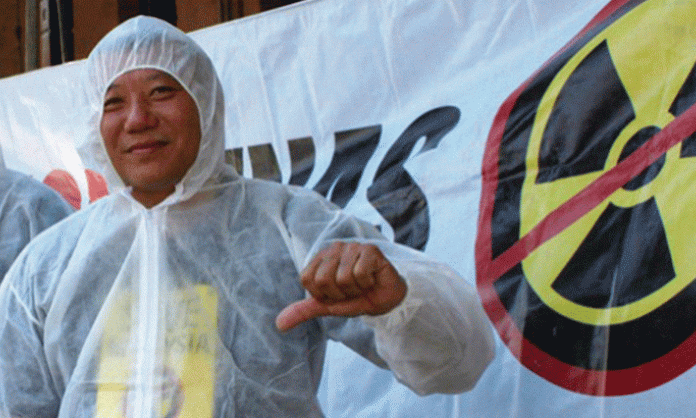Malaysian activists have built a powerful movement against an Australian mining company that is using their country as a dumping ground. Chloe Rafferty reports.
“We have given them an ultimatum – we give them six months to comply with recommendations … otherwise the 1.2 million Malaysians will shut it down”, says Wong Tack, speaking to Red Flag. “The people will shut it down by June 29 [2014].”
Tack is a leading figure in the movement against Australian mining company Lynas Corporation. He is talking about a toxic rare earth refinery built by Lynas in the Malaysian port city of Kuantan.
The plant, which is the world’s largest, processes minerals extracted from the Mount Weld rare earth mine in Western Australia. Annually, the Kuantan refinery produces 91,600 cubic metres of waste containing radioactive elements. It expels waste water directly into surrounding waterways. This has sparked large protests.
Recently, Tack and others from the Himpunan Hijau (Green Assembly) movement visited Australia, taking their message directly to Lynas’ Sydney headquarters. “Our purpose here is to send the strongest message to Lynas’ management and investors that we will never let go of our struggle until the Lynas plant is shut down”, he said.
The movement, which took off over three years ago, has grown to be a key political issue in Malaysia. “What started as protests with only a few hundred people has grown to include demonstrations of 20–30,000 people”, says Tack.
Malaysians know all too well the risks corporations take with the lives of others in order to turn a profit. In 1994 another rare earth refinery owned by Mitsubishi Chemical Industries was shut down after a series of mass demonstrations and legal action by opponents. The Asian Rare Earth plant was linked to a spike in birth defects and child leukaemia.
Today, Lynas’ plant processes 10 times the amount of ore that Mitsubishi’s did 20 years ago. Yet, with the help of friends in government, the company has so far avoided submitting a radioactive waste management plan.
The anti-Lynas movement has quickly learned that a fight with corporate polluters is also a fight with the state that protects them. “How could we as citizens trust this authority to look after the welfare of the people? We have given up on this government”, says Tack.
The Malaysian ruling class has long assisted Australian corporations to ride roughshod over the rights of Malaysian workers and citizens. Australian capitalists are now using Malaysia as a toxic dumping ground. They have been welcomed by Malaysia’s ruling elite with open arms and a 12-year tax holiday.
The Kuantan High Court has declared that the onus of proving the plant is not safe rests with the public and has given the company a green light to operate. The Malaysian minister for science, technology and innovation, Abu Bakar Mohamoud Diah, has consistently ignored safety recommendations from experts, describing the plant as “as safe as a soy sauce factory”.
When asked why waste from the plant couldn’t be sent back to where the minerals came from, the Western Australian minister for mines and petroleum, Norman Moore, firmly rejected the idea: “Australia will not accept responsibility for any waste product produced from offshore processing of resources purchased in Australia.”
The Himpunan Hijau movement has been turned away by the Australian government. “We have talked to the Australian high commission in Kuala Lumpur. They said that ‘As your government has approved it [we] won’t do anything’”, explained Tack.
In a recent statement, Thulsi Narayanasamy, director of Aid/Watch – an independent watchdog that monitors Australian aid and trade – described the power of Australian imperialist interests in the region.
“Here is yet another example of an Australian mining company operating abroad despite ongoing and widespread opposition from locals in addition to well-founded environmental concerns…”, he said.
“Many people don’t realise how serious the activities of Australian mining companies overseas are, and their ability to get away with a flagrant disregard for people, the environment and the law.”










